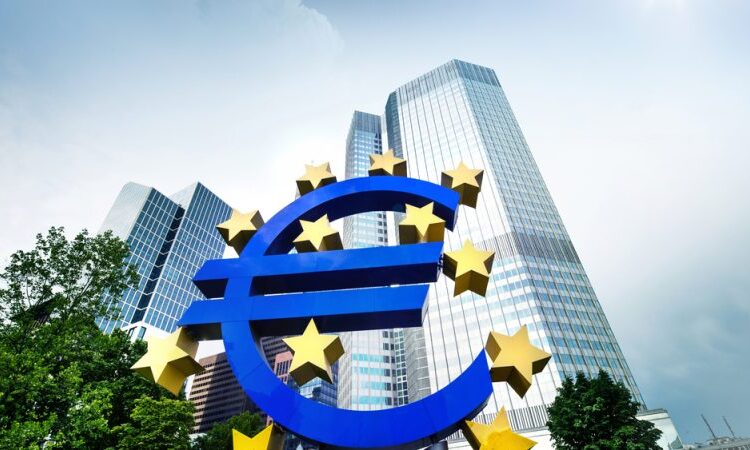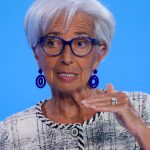
The head of Europe’s largest trade union organisation has issued an urgent plea to the European Central Bank (ECB) to cut interest rates at its meeting later this week, arguing the bank’s tight monetary policy has already inflicted “unnecessary” financial pain on European workers and could potentially induce recession.
Esther Lynch, the general secretary of the European Trade Union Confederation (ETUC), also called on European policymakers to introduce windfall taxes on corporate profits, which she said the ECB’s analysis shows is a major cause of Europe’s high inflation rate.
“The ECB needs to urgently bring down interest rates to limit the damage of its misguided policy, and national governments should impose windfall taxes on the excess profits made by banks as a result of it,” Lynch told Euractiv.
The ECB has hiked interest rates ten times since Russia invaded Ukraine in February 2022, sending prices soaring, bringing its benchmark deposit facility rate from negative levels to a record high of 4.0%. It paused rate hikes at two previous policy meetings in October and December.
Falling on deaf ears?
Lynch’s pleas notwithstanding, the ECB is widely expected to leave interest rates unchanged for a third time at its next meeting on Thursday (25 January).
Last week, ECB president Christine Lagarde said that although it is “likely” that rate cuts will be introduced by the summer, wage bargaining data used by the bank to determine monetary policy will only be available “in April [or] May”.
Lagarde also noted that markets were “not helping the fight against inflation” by being too optimistic about rate cuts being introduced earlier than expected.
Further dampening the chances of a rate cut is the fact that Eurostat, the EU’s official statistics office, reported last week that year-on-year headline inflation in the eurozone rose to 2.9% in December last year, up from 2.4% in November: the first uptick since April. The ECB’s official target rate is 2%.
The ECB’s tight monetary policy is widely believed to have contributed to the eurozone’s anaemic economic performance over the past year.
The International Monetary Fund estimates that real eurozone growth slowed to 0.7% in 2023, down from 3.3% in 2022. Germany, the eurozone’s largest economy, is believed to have been in a recession for the past two years.
European workers have suffered significantly during this period. A recent report by the European Commission noted that “workers’ rate of financial distress and material and social deprivation have increased sizeably” since the end of 2021.
A profitable increase
Lynch’s claim that the eurozone’s inflation crisis is primarily driven by surging corporate profits is also corroborated by other analysts – including, as Lynch notes, the ECB itself.
In a speech delivered in June last year, Lagarde noted that during previous eurozone crises, consumers’ unwillingness to tolerate price hikes meant that “firms had tended to absorb rising costs” – but that the “special conditions” over the past two years have “turned this regularity on its head”.
“The sheer scale of input cost growth made it harder for consumers to judge whether price hikes were caused by higher costs or higher profits, fuelling a faster and stronger pass-through,” she said. “At the same time, pent-up demand in reopening sectors, excess savings, expansionary policies and supply restrictions brought on by bottlenecks gave firms more scope to test consumer demand with higher prices.”
Experts contacted by Euractiv confirmed profits’ role in contributing to Europe’s inflation crisis.
“Statistical evidence confirms that the increase of the margins of some companies, in some sectors, have contributed to the high inflation rates observed in 2022 and 2023,” said Eric Dor, the director of economic studies at the IESEG School of Management.
He added that the contributions of profit margins in the construction and industrial sectors have been “especially” high.
Doralso also stressed that the eurozone’s “very poor” short-term economic forecasts would “normally be a reason to cut rates”.
However, he pointed out that the fact that the ECB’s mandate obliges it to focus solely on inflation rather than other economic measures such as employment (as is the case for, e.g., the US Federal Reserve) means that the bank is effectively obliged to refrain from cutting interest rates at its Thursday meeting.
Maria Demertzis, a senior fellow at Bruegel think tank, agreed that “profit-induced inflation” was “an important contributor to inflation” in 2023. She also predicted that the ECB would likely be cautious in introducing rate cuts – and that they will almost certainly be overdue when they do eventually arrive.
“The ECB is going to err on the side of being too late in switching policy direction,” she said. “They do not want to find themselves in a position of having switched to need to switch back. So they will wait longer than needed.”
[Edited by Alice Taylor]







